#Multilayered Texts
Text
"If they can get you asking the wrong questions, they don't have to worry about answers."

Thomas Ruggles Pynchon Jr. is an American novelist noted for his dense and complex novels. His fiction and non-fiction writings encompass a vast array of subject matter, genres and themes, including history, music, science, and mathematics.
Reclusive Nature: Pynchon is famously reclusive, rarely appearing publicly and avoiding interviews and media attention. This aura of mystery has only added to his mystique as a writer.
Academic Background: Pynchon studied engineering physics at Cornell University, where he developed an interest in literature and writing. He later pursued graduate studies in English at the University of Washington.
Military Service: Pynchon served in the United States Navy from 1955 to 1957, an experience that influenced some of his writing, particularly in his novel "Gravity's Rainbow," which includes themes related to World War II and military technology.
Literary Career: Pynchon gained widespread acclaim with his debut novel, "V.," published in 1963. He followed this with several other highly regarded works, including "The Crying of Lot 49," "Gravity's Rainbow," and "Mason & Dixon." His novels are known for their dense prose, intricate plots, and exploration of complex themes.
Awards and Recognition: Pynchon has received numerous awards and honours throughout his career, including the National Book Award for Fiction for "Gravity's Rainbow" in 1974. He has also received the MacArthur Fellowship, commonly known as the "Genius Grant," in recognition of his contributions to literature. Despite his accolades, Pynchon remains relatively elusive, preferring to let his writing speak for itself.
#American Novelist#Literary Fiction#Postmodernism#Complex Narratives#Historical Fiction#Music in Literature#Science in Literature#Mathematics in Literature#Experimental Fiction#Metafiction#Counterculture#Paranoia#Cultural Critique#Interdisciplinary Themes#Mystery Fiction#Satire#Intricate Plotting#Allusions and References#Multilayered Texts#Intellectualism#today on tumblr#quoteoftheday
1 note
·
View note
Text
exitmice => blackhorsemackerel
my friend trying to drag me back to tumblr so here i am 🙈 so changed up my @ just cleared out my following (mostly dead blogs n stuff i'm not into anymore). i don't think i broke any mutuals but if i did that accidentally lmk!
#text post#graduated from being a weeb i'm in my old man yaoi era now (good omens)#sorry to all the nemo fans#the @ is like a multilayered joke. don't worry about it
5 notes
·
View notes
Text
not me, blocking a random stranger things blog I was looking through bc they shared the same ships and favourite characters after I found an anti-kali post
yes I am that petty
#look there’s a lot I’ll go through but not when it comes to my girl#‘kali was being totally maniuplative she forced el blah blah blah’ please just leave#just say admit you can’t understand the text and multilayered characters and go#kali#fucking most boring argument I hear against kali’s character
3 notes
·
View notes
Text
Anyways not to be mentally ill about kai again for the upteenth time but I was just turning over how exactly interactions between him and nimbus would go in my head. Because as much as I love our sweet dumb thembo nimbo as any other lightfall enjoyer, I think it’s a bit of a watered down interpretation at best and a woeful misinterpretation of their character just to fit the popular framework of the trope at worst. Maybe I’ll make another post later about their character in-depth after I go rewatch a playthrough or something. Maybe
Anyways. getting off track. kai and nimbus. two of the Most characters ever. Nimbus can and will absolutely see through his edgy tough guy act in a split-second and not think a single thing of it as they instantly clock this guy as absolutely starved for positive attention and proceed to make it their life’s goal to befriend him and offer him compliments as much as possible. Kai is having a mental breakdown not only because of Strand and how mastering it means to relinquish control and Light and Darkness not being moral opposites but also this tall buff simple and fun-loving stranger is just?? being nice to him??? for no reason?? And it’s honestly kinda sad how it’s taken over a century and a quarter for literally anyone he’s ever met to be friendly towards him just. because they can. because they want to be. because they see someone worth being nice to in him, somehow. And it drives him up the fucking wall because that’s not how things work with him. Everyone who’s ever nice to anyone only wants to get something out of them and will turn on them the second they do something wrong or the other person doesn’t get what they want. His is a world of secrecy and manipulation and playing your emotions as close to your chest as you can manage so no one ever has a clear advantage over you
But nimbus doesn’t care about any of that. Kai’s out there smacking bad guys with green stringy stuff and they genuinely think that’s the coolest shit they’ve ever seen so they tell him that, no false modesty or pretense about it, just genuine compliments and encouragements to someone who they can see desperately needs them. To kai it feels a little bit like some heavy weight being lifted off his shoulders for the first time in a very long time and a lot like having his ribcage torn open and his body skinned alive and left out in the heat of the midday sun to whither and burn and rot
#sorry for that last sentence.🧍#no i’m not actually#i always have very normal feelings about kai#and also nimbus. i am entirely normal about them. destiny lore casuals don’t understand their character but I Do#they are so fascinating and multilayered. to me#destiny#destiny 2#destiny oc#destiny 2 oc#lightfall#nimbus#destiny nimbus#oc: kai#oc talk#legacy dot text
3 notes
·
View notes
Text
lol i hate today’s era of absolutely zero nuance takes. a friend didn’t behave exactly as you’d wanted them to? cut them off. a guy didn’t text you back instantly bc he has his own life? he’s just giving you breadcrumbs. doing something makes you uncomfortable? don’t do it anymore. someone isn’t instantly available for you? disinterest. just absolutist statements that often don’t apply to the multilayer situations of everyday life. like. stop. literally just stop it
113K notes
·
View notes
Text
it's crazy how, if you really want, quantum leap can be a complex, multilayered text about a genderfluid transfeminine autistic time traveler scientist sent on a divine mission by God doomed to martyr herself for humanity while her sixty year old closeted bisexual best friend pines after her in an impossible cosmic tragic romance where they can never touch; with themes of trauma as a disruption of linear time, tragic heroism, dog motifs, etc. but also if you don't actively want it to be that, it's literally not that at all and that is an insane thing to say
#txt#queap#quantum leap#like. many such cases. beginning to understand what the spn people were talking about etc.#also for the record i am referencing another post that is about mash by tumblr user thealogie. i cant find it rn but its a permanent part o#my vocabulary now its embedded in my brain. thank you for understanding#my posts
212 notes
·
View notes
Text
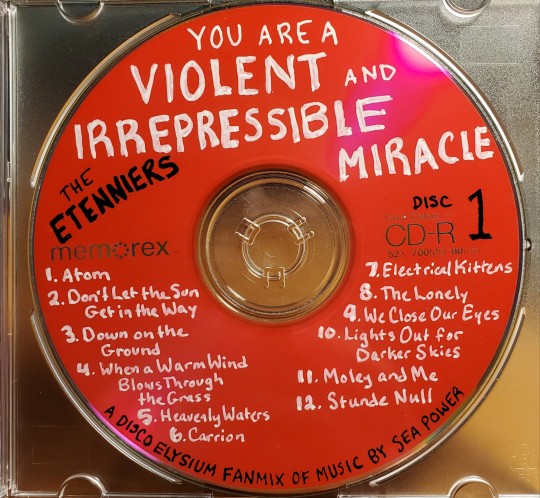
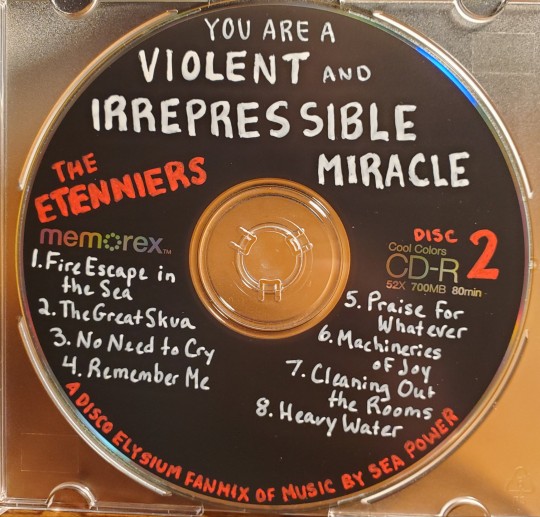
I made a Disco Elysium fanmix like it's 2006 (because my car is almost that old and the aux port is broken).
Disco Elysium's soundtrack was done by the band Sea Power, which exist in-universe as The Etenniers; several of their pre-existing songs are used the game soundtrack, quoted in the game text, and even used as inspiration for game lore. I've been doing a deep dive into their discography and many of their songs have similar themes to Disco Elysium: apocalypse (nuclear, environmental, personal), complicated feelings about one's homeland, depression, suicide, drug and alcohol use, the weight of history, revolution. Their lyrics are complex and multilayered and use a lot of metaphorical imagery that resonates with DE too.
The playlist is intended to roughly follow the course of the game from start to finish, but most of the songs feel like they could be about several characters/events/ideas - it's a game where many characters parallel each other and events narratively and literally echo through time.
Track list and links in reblog.
#disco elysium#de fanmix#de music#sea power#de os#will tumblr banish this from the main tag because of the links?#if so I will do some fast editing after posting#edit: yep :(
512 notes
·
View notes
Text
“laena/rhaenyra wasn’t even a paragraph why are you so mad that they were scrapped for the show?”
oh i don’t know janice maybe because it being in a historical text written 200 years after the fact by ultra religious MEN who despise women and queerness all together IS noteworthy? ‘more than fond of’ is an allegory used multiple times in the asoiaf main timeline to describe romantic feelings and you’re mad that people read that phrase the way it was intended? not to mention it’s used in conjunction with ‘while the princess misliked her stepmother’ like COME ON at this point you’re being deliberately stupid. i’m sorry they weren’t scissoring each other for 200 pages but in actuality what did you expect? acting like rhaenyra and alicent were so so in love when we were only shown a couple scenes of them getting along max during a six month period. the only way that ship will ever be canon is through the actors. the show leaves crumbs for asshats like you because they know you’ll bend over backwards to defend them. apparently it’s still okay to queerbait in the year of our lord 2k24; along with sidelining a woman of color because diversity was important until it came to fleshing out a black woman and her canon sapphicness.
laena, for the limited time we had her character, was fiery, bold, and adventurous. she claimed the largest and oldest dragon alive at 12! the show choosing to racebend her only to mitigate her affect on the plot is gross! they did it to keep the ‘what if they were in love’ guessing game and gift it to a white woman. a white woman who vehemently HATED rhaenyra. we just wanted the story to have complex and multilayered characters rhaenyra has NO FRIENDS besides the first *two* episodes that is the definition of shitty storytelling. a targaryen princess at the height of her families power the literal protagonist of the dance and you all want her to be a lonely spinster boy mom who’s not like the other girls so bad when she was literally surrounded by women all of whom she cared about dearly. multiple relationships with others helps bring a story to life and would’ve helped tremendously with making the dumb as rocks audience understand rhaenyra’s character and how she was a girls girl in a time where you really couldn’t afford to be one which is why it’s so tragic when she starts turning on them during the dance but nooo the ONLY relationship that matters is a busted up friendship that the writers have in a chokehold for no good reason and fuck everyone else that these women might care about right? fuck rhaenyra fuck laena fuck alicent fuck their kids fuck their GRANDKIDS they’re all just mostly blank slates anyway what impact is their death going to have on the narrative? next to nothing because of these fuckass decisions. let’s just all agree to throw stones at glass houses THAT would be more fulfilling for the show than half of the shit they gave us.
#house of the dragon#hotd critical#rhaenyra targaryen#laena velaryon#laenyra#anti rhaenicent#like where’s her ladies in waiting?#where’s at least a friendship with laena?#gone bc the show deemed all of it unimportant in the face of rhaenicent#character building is IMPORTANT#relationship building is IMPORTANT#world building is IMPORTANT#just like how they’ve continuously screwed over the children too#the heart of the conflict and they have liminal if any personality#how and why are we supposed to care?#i need rhaenicents to take a back seat and stop talking over laenyra#your ship is LESS canon despite all of your pre conceived headcanons#rant post
35 notes
·
View notes
Text
Midjourney Image Prompting vs Style Prompting




Top Left - image prompt + text prompt
Top Right - Style prompt + text prompt
Bottom Right - image prompt + style prompt + text prompt
Bottom Left - Just text prompt.
Prompt used for the above images: space and planets in astronomy, in the style of detailed fantasy art, multilayered realism, dark violet and gold, xbox 360 graphics, clockpunk, transportcore, detailed penciling:: an image of a man riding a wave, in the style of dark white and teal, flickr, close up, naturalistic ocean waves, andreas achenbach, 3840x2160, helios 44-2 58mm f/2
(still) Playing around with Midjourney's new style prompting system, to demonstrate what exactly it does and how.

Style prompting isn't the same as style transfer, which was an early deep-art process that used a single image as a style reference. It's a glorified filter by current standards, but it produced neat effects, and you can still get the done at places like deepdreamgenerator if you're so inclined, though you have to dig for it.

I did, however, use an old style transfer piece as my image input for the style and image prompting experiment here. Both style and image prompting work in essentially the same way, by using the AI's image-recognition/checker function to examine a submitted image, which gets broken down into the token-language the AI uses the same way a text prompt does. Those tokens are then used as part of the prompt.
Image prompting uses all the tokens, while style prompting filters out all the ones not associated with 'style', though the AI is pretty wacky with that.

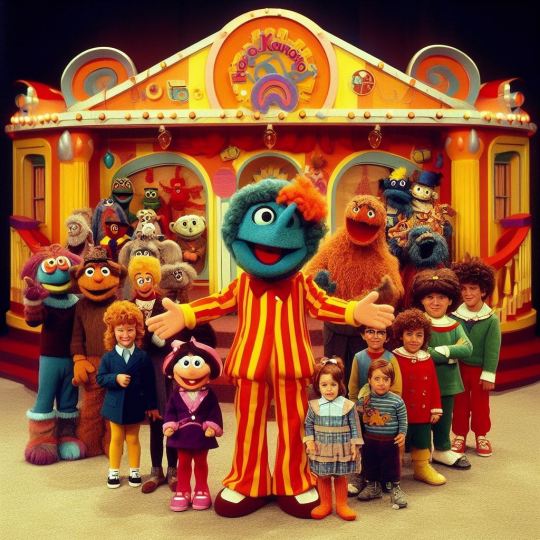
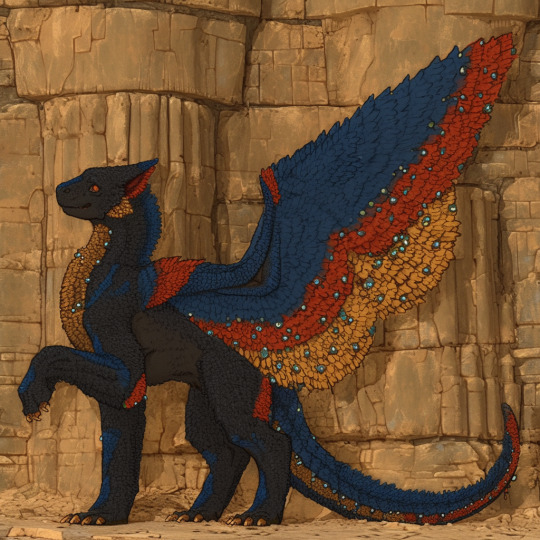

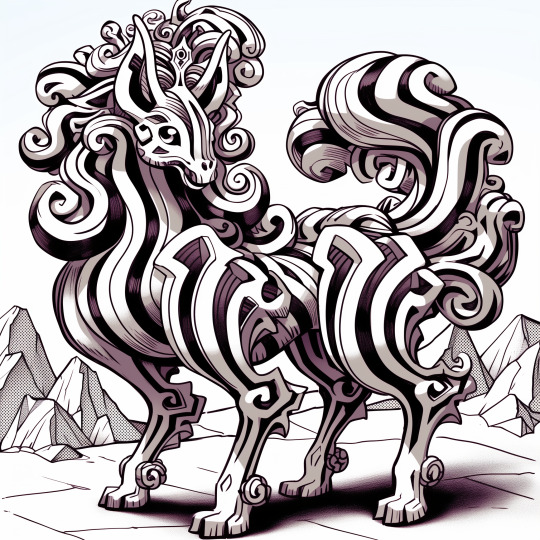

Left, image, right its style prompt. As you can see, it's more 'vibe-y' than accurate, especially when preturbed by the text prompt. Because no pixel data gets utilized, the robot essentially has to describe the picture to itself and reproduce it from memory.
In essence, it's just like /describe or clip interrogator, only it doesn't translate the tokens back into text.
For concepts that don't have a lot of lingual distinction but do have aesthetic distinction, it really helps the process. Very useful for vintage aesthetics that MJ normally bucks against.
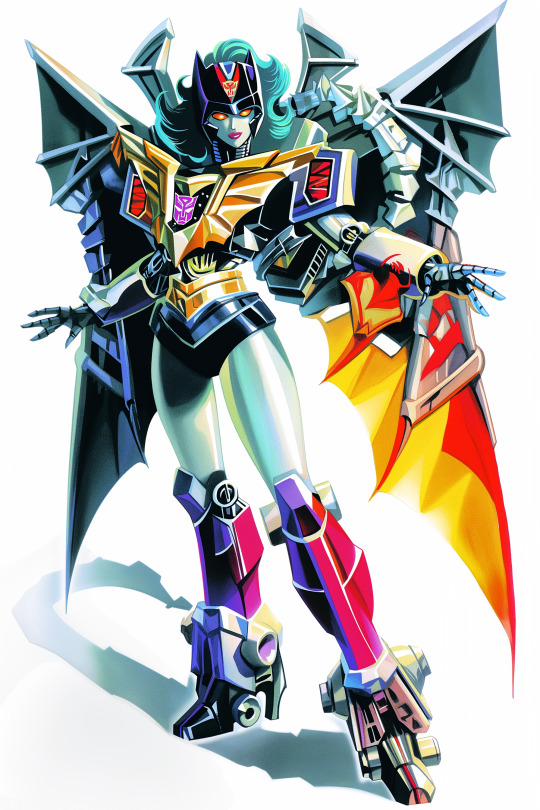
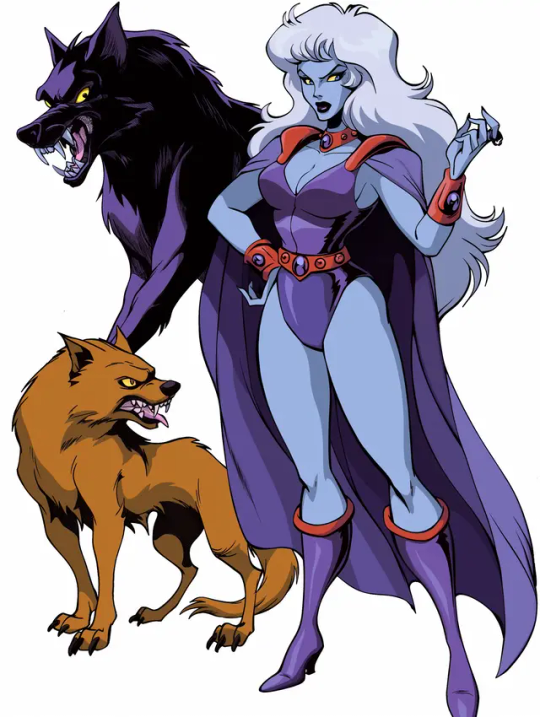
But the real fun has been using it to recreate the kind of generative madness earlier models that weren't as coherent could produce, only now with some additional coherency (with a lot of coaxing).
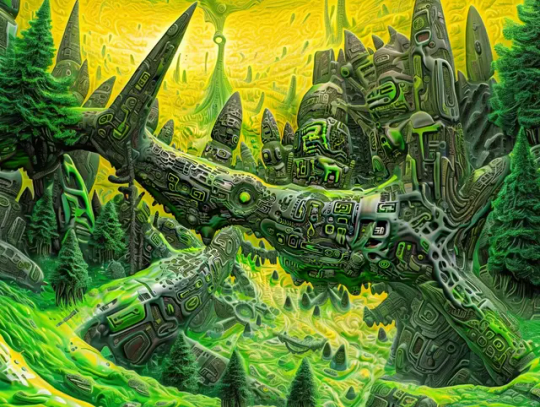
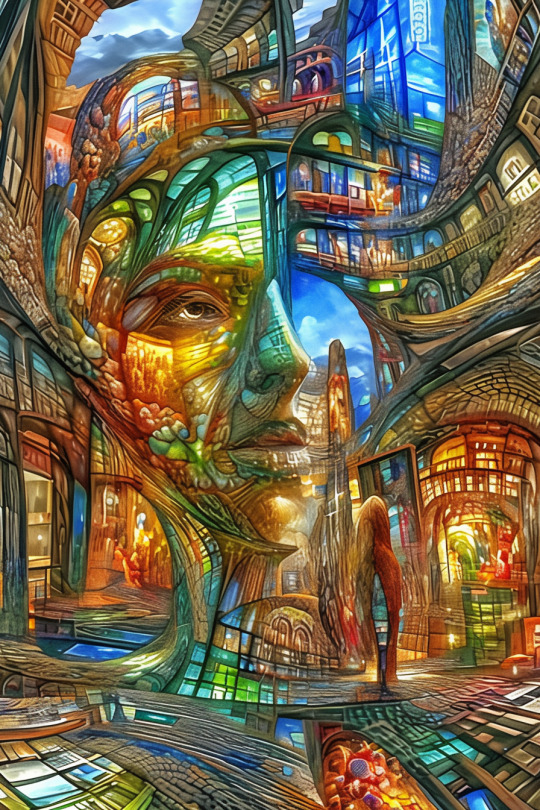
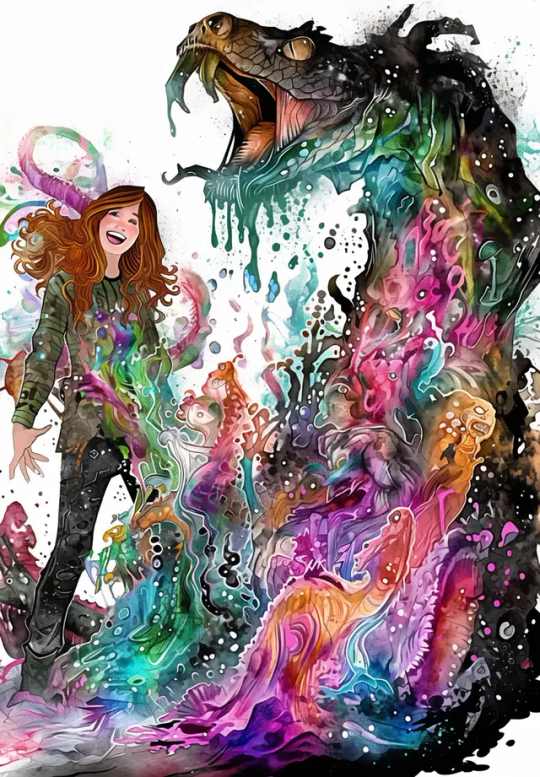
The real fun comes with mixing very, very different styles (you can use up to 3 per prompt)
That's a future post.
#ai experiments#midjourney v6#nijijourney v6#image prompting#style prompting#/describe#AI artwork#AI art#midjourney
48 notes
·
View notes
Note
hi there! Just finished the audiobook of Dorian Grey and I have OPINIONS. Was wondering if you could recommend any reading re: flower language or other symbolism in the book?
Also I think it’s fascinating how at the end, Harry tells Dorian that he doesn’t have it in him to be a murderer, which highlights very dramatically how wrong he’s been about Dorian. In fact, I’m reminded of the epilogue of Jane Austen’s Persuasion, where Lady Russel has to learn she’s been “wrong about pretty nearly everything”. All Harry’s certainty about philosophy and hedonism and enjoyment of dominating Dorian’s personality, and he’s wrong. There’s not a single reliable narrator in the whole book.
Also also, the book that “poisoned” Dorian - is that a reference to a real world book from Wilde’s time, do you think? Or a self-referential nod to the book we have in our own hands while reading Dorian’s story?
Also the third, Basil needs better friends. I’ve decided that he played dead for 18+ hours while his blood was pooling around his feet, and Alan helped him escape, and then Alan pretended to end his own life and the two of them escaped to the Continent to set up a halfway house for Boys Dorian Messed Up.
And it seems like Harry actually really misses his wife now she’s gone? Or maybe he just misses being wanted by her? I wonder how he takes the news of Dorian’s death?
...hello! I'm delighted that you enjoyed The Picture of Dorian Grey, which is indeed a fascinatingly multilayered text (with nary a reliable narrator to be found.)
I'm wondering, to be honest, if you have me confused with another literate academic on here. I am an historian, not a literary scholar, and I'm not a Victorianist. I can recommend @jstor, and commend you to the generosity of my followers.
142 notes
·
View notes
Text
I finished reading Dungeon Meshi last year and loved it, though it was hard to express my enjoyment with others outside of dedicated discord groups or subreddits. Which is why I am so very grateful for the existence of the anime (which I'm also watching and enjoying) for bringing Dungeon Meshi series into the limelight, because now I've been seeing more and more fanart and text posts about it ever since. It's honestly one of the best manga I've read in a long time, and one of the most interesting and fleshed-out takes on the "fantasy RPG/dungeon crawler" settings I've seen yet, with both the characters and the dungeon itself being multilayered and more complex than they first appear. So it's great to see it getting the recognition it so thoroughly deserves.
30 notes
·
View notes
Text
you don't understand I need to talk about shostakovich's antiformalist rayok because HOLY SHIT
okay. so.
I've been wanting to talk about rayok for a while because it's truly mind-blowing what rayok is. hell, it's mind-blowing, considering the circumstances, that we know about rayok. and it's even more mind-blowing what we don't know about rayok. this is probably one of the most impressive works by shostakovich when you really dig into it, just because of how ridiculously multilayered it is. there are scholarly essays and research conducted on this piece because the rabbit hole that is rayok just goes so fucking deep that in order to fully understand it, you need to know a decent bit about music, russian history, the russian language, the relationship between the soviet government and the artistic sphere, etc. I'll mainly be citing manashir yabukov's essay on it in rosamund bartlett's "shostakovich in context," because while there are many publications about this piece, this one is especially comprehensive.
so. what is rayok. WELL.
the antiformalist rayok, simply put, is a shitpost. less simply put, it's a satirical cantata by dmitri shostakovich. it lampoons stalin- and post-stalin era political officials who attempted to interfere with the artistic, particularly musical, culture of the soviet union. shostakovich essentially argues in this piece that political figures have no business policing the arts, especially when they have little to know artistic knowledge themselves.
the way "rayok" works is sort of like a soviet musical SNL skit. there are four characters at a conference on "realism and formalism in music" (sometimes played by the same singer) who are all caricatures of a specific political figure or idea, imitating these figures in a mocking, ridiculous way. the characters are the announcer, who introduces the other three, "yedinitsyn," who represents stalin, "dvoikin," who represents andrei zhdanov, head of the central committee propaganda department of the USSR, and "troikin," who represents zhdanov's successor, dmitri shepilov. shostakovich caricatures each of these figures through references to quotes or speaking patterns, musical quotations, or satirizing their ideologies. for instance, yedinitsyn's (stalin's) verse is often sung in a georgian accent (stalin was a native of georgia), the music quotes the folk song "suliko" (said to be stalin's favorite song), and the text is repetitive without saying anything, parodying stalin's manner of delivering speeches. (an example of a line- "formalist composers are formalist because they write formalist music")
nobody knows quite when rayok was written, or if shostakovich was the sole author. we know that shostakovich often performed it in private gatherings with close friends, but the authorship of the text is disputed. shostakovich wrote the music, but it's contested who wrote the words- shostakovich's friend isaak glikman claimed that shostakovich was the sole author, while another friend, lev lebedinsky, claims he had a hand in writing the text. (many of lebedinsky's other claims have come into dispute.) interestingly, rayok is referenced in "testimony," the highly controversial supposed memoir of shostakovich, which was published before the piece became known to the wider public. it's assumed that shostakovich started working on "rayok" around 1948, and continuously added onto it into the 1960s. along with the piece itself, shostakovich also wrote a hilarious preface (which I'll get into later) and a sarcastic questionnaire to go with it, perhaps as a nod to ideological exams that were required in schools.
so, what does the title "antiformalist rayok" mean? that requires some historical context. "formalism" was a term used to describe art considered unacceptable by the soviet government, and was used most often from the 30s to the early 50s. it originated from the term in academic analysis which meant interpreting a work of art by its "form," or removed from the context intended by the author. formalist analysis was popular in the late 1920s, a more liberal time in soviet history that gave rise to an avant-garde art movement. as such, by the 30s, art considered "formalist" was deemed "art for art's sake," and was derided as "bourgeois" or "western." the crackdown on the arts was part of a larger cultural campaign under stalin, in which he sought to increase the soviet union's industrial production and differentiate it from the west, both culturally and politically. "antiformalist" art, therefore, was the opposite of "formalist"- safe, patriotic, and easily digestible by the masses. such art was also referred to as "socialist realism." "formalist" artists faced increasing persecution that culminated in the "great purges" of the late 1930s, a campaign that sought to eliminate anyone who could be viewed as a threat to the soviet union through exile, arrest, or execution. people who were purged included stalin's political opponents, artists, accused german spies (often in the military), ethnic minorities, farmers who refused collectivization of their land, and civilians suspected of dissent.
still with me? good.
now, the word "rayok." this is a reference to two concepts- rayok shows, and another piece of classical music called "rayok" by modest mussorgsky, a 19th century russian composer. the original word "rayok" refers to rayok shows- a popular form of entertainment in 18th and 19th century russia, in which rotating figures of people or animals would be displayed inside a fairground box with holes that viewers could look through. a performer called a rayoshnik would rotate the figures in the box with a crank and narrate a story, usually of a satirical nature:

mussorgsky's "rayok" took its name from this form of entertainment. like shostakovich's "rayok," it was a satirical piece, focusing on the conservative musical establishment and its patrons, in which specific people were lampooned, similar to the performances by the rayoshniki. by the 1920s, rayok shows were beginning to die out, but shostakovich (b. 1906) displayed an interest in them. as a reference to these performances, he sometimes jokingly referred to his colleagues in letters with exaggerated diminutives, a common practice in rayok shows- for instance, the composer vissarion shebalin was "shebalalishki." (put a pin in that bit about diminutives. it'll be important later.) shostakovich's title "antiformalist rayok" is therefore a reference to the mussorgsky piece and rayok shows, as well as the concept of "antiformalism."
and if you think that's complicated, that's only the title.
so, let's walk through the piece. again, there are four characters- the announcer, yedinitsyn (stalin), dvoikin (zhdanov), and troikin (shepilov). the names "yedinitsyn, dvoikin, and "troikin" correspond to the words for the numbers one, two, and three in russian. some people speculate that these names do not only refer to the order the characters appear, but also the russian school grading system. in russia, students' assignments are graded on a scale of 1 to 5, with a 1 being the lowest grade, and a 5 being the highest. therefore, these names could potentially be a snide remark on the intelligence of shostakovich's subjects of ridicule. elizabeth wilson also notes that the name "troikin" could be a reference to the nkvd's "troika"- a group of three secret police members tasked with sentencing the accused to imprisonment or death, which would line up with troikin's remarks towards the end of his verse.
"rayok" starts out with the announcer introducing a panel on "realism and formalism in music." he introduces yedinitsyn, who sings over and over again about how "realistic music is written by the people's composers, and formalist music is written by formalist composers." that's it. that's the whole verse. as I said, there's a suliko quotation to tip us off to the fact that this is stalin (shostakovich even lists his full name in the score as I.S. Yedinitsyin- as in Iosif Stalin, removing any doubt of who yedinitsyn represents). the announcer then says, "let us thank our dearly beloved comrade yedinitsyn for his historic speech, and for his exposition, enrichment, and elucidation of complicated issues of the musical sphere." this is typical shostakovichian sarcasm- as seen in his letters, he tends to over-elaborate a statement to communicate distaste or irony. this statement is even funnier when we consider that yedinitsyn did not "elucidate complicated issues" in his verse, but rather repeated the same thing without elaborating. and of course, the ensemble thanks him for his "historic speech" and "fatherly care."
the next character up to the stand is comrade dvoikin, and this requires a LOT of historical context to explain. while yedinitsyn is fairly straightforward, dvoikin and troikin are much more multilayered. so again, bear with me as I go on another tangent about soviet history.
in 1946, andrei zhdanov launched a series of denunciations and censorship against soviet writers and poets. by 1948, this expanded to scientists and musicians, in a period known as "zhdanovshchina." among the composers denounced during zhdanovshchina were big names like shostakovich, prokofiev, and khachaturian, as well as a little-known georgian composer named vano muradeli. muradeli had written an opera called "the great friendship," which had come under fire because he had written his own lezghinkas (a kind of caucasian folk dance) for the opera, instead of incorporating "authentic lezghinkas" instead. shostakovich, as one of the most prominent composers to be attacked during zhdanovshchina, was particularly targeted. many of his works were censored, he was fired from his teaching positions at the leningrad and moscow conservatories, and he was pressured into denouncing his own music, resorting to writing banal film scores and ideological pieces to make a living. while no composers were arrested during zhdanovshchina, it still took a heavy toll on many of their lives, shostakovich included. worse yet, after ww2, a wave of anti-semitism in the soviet union began to take hold around the same time, impacting many jewish artists and professionals. some were assassinated, including solomon mikhoels, the father-in-law of mieczyslaw weinberg, a composer and close friend of shostakovich's. (weinberg himself would be arrested on false accusations of zionist conspiracy, but was released from prison after stalin's death.)
so, all that being said, 1948 was a really, really bad time in the soviet union. this is likely when shostakovich began composing rayok, as well as some of his other "desk drawer" pieces that would not be performed until after stalin's death, such as the first violin concerto and the "from jewish folk poetry" song cycle (note- while shostakovich was not jewish, he took a strong stance against anti-semitism, which would be more pronounced in his later years).
as such, zhdanov comes under serious fire in "rayok." many of his speeches are referenced, if not quoted word for word, in "dvoikin's" lines, including where he refers to dissonant and atonal music as a "dental drill" and "a musical gas chamber." these criticisms were leveled by zhdanov at shostakovich's music- the second directed towards his eighth symphony. this was a serious insult considering the time period- the 8th was written in 1943, when the soviet union was at war against nazi germany. in his essay, yabukov points out something interesting- after the ensemble laughs at dvoikin's remarks, a transposed instance of the dsch motif- shostakovich's musical representation of himself- is heard, implying that while zhdanov is laughing at him, shostakovich ultimately gets the last laugh by satirizing him in "rayok." dvoikin is introduced as having the "ability to vocalize" as he sings exaggerated arpeggios, a dig at the fact that zhdanov was said to be a good singer. he stresses how music must be harmonic, beautiful, elegant, etc., until the music does a complete 180 from oversaturated, kitschy romanticism into- of all things- a georgian lezghinka, just like zhdanov denounced muradeli over. he suddenly sings obsessively about how "in caucasian operas, there must be authentic lezghinkas," the caricature exaggerating to ridiculous lengths as he sings (and in some productions, dances) the lezghinka, before the announcer gives the floor to troikin.
troikin. troikin. oh boy, troikin.
while troikin is based on dmitri shepilov, soviet minister of foreign affairs during the khrushchev era, he can be read to represent, in general, the disastrous effects of politicians in the musical sphere. troikin is portrayed as a complete idiot, singing to a simple melody about how "the soviet man is a very complex organism." in my favorite joke in the entire piece, troikin sings the names "glinka, tchaikovsky, rimsky-korsakov" three times in a row- romantic-era russian composers whom soviet composers were encouraged to imitate, in opposition to avant-garde western composers. (note- tchaikovsky is a complicated case when it comes to his legacy in the soviet union, but his music was regarded far more positively after ww2 than before it, due to the increase in russian nationalism during the war to boost morale.) during this part, troikin mispronounces "rimsky-korsakov" as "rimsky-korSAkov" each time, singing to a 3/4 time signature (for you non-music people, that's like a waltz rhythm). the mispronounced syllable falls on a downbeat, making it stand out even more. according to lebedinsky, shostakovich once heard shepilov give a speech, in which he listed off the names of classical and romanticist composers that soviet composers ought to imitate. however, he pronounced "rimsky-korsakov" as "rimsky-korSAkov," and shostakovich thought it was so hilarious that he puts it directly into the spotlight in "rayok." (remember covfefe? it's like covfefe.) and FURTHERMORE, during this "rimsky-korSAkov" bit, shostakovich is quoting a song called "we'll tell you" from a film score called "faithful friends." this film score was written by none other than tikhon khrennikov.
who's tikhon khrennikov, you may ask? khrennikov was the general secretary of the composer's union from 1948, all the way up to the fall of the soviet union in 1991. he played a role in the zhdanovshchina denunciations against shostakovich, but later stated he was pressured into it. whatever the case, shostakovich didn't forgive him, and we'll see another multilayered shot at khrennikov a bit later on.
troikin continues to be a hot mess on stage. he begins listing kinds of music that should be written, but gets stuck on "suites," before giving up entirely and switching to a parody of "kalinka," a popular folk song. this in itself is another joke- troikin knows nothing about classical music, so he switches to a folk song associated with socialist realism, but it's like, one of the most basic ones you can think of. and in these modified "kalinka" lyrics, troikin drops two names- "dzherzhinka" and "tishinka."
okay, remember what I said about rayok shows and how the rayoshniki performers liked to use exaggerated diminutive names as a part of their satirical shows? this is an example of that right here. "dzerzhinka" refers to one ivan dzerzhinsky, a socialist realist composer best known for his opera "quiet flows the don," whom shostakovich was on unfriendly terms with- shostakovich had helped dzerzhinsky with the music for "don," which was upheld as a "proper" soviet opera after the denunciation of shostakovich's own opera, "lady macbeth of the mtsensk district," in 1936.
tishinka, of course, is khrennikov once again, but there's another layer here. "tishinka," as yabukov points out, was also the nickname for the transit prison "matrosskaya tishina," or the "silence of the sailors." but shostakovich uses the words "raskhrenovaya tishinka"- yet another triple play on words. "khrenoviy" means "rotten" or "worthless," "ras," in this context, meaning "completely." and furthermore, "khren"- as in "raskhrenovaya" and "khrennikov," means "horseradish," and can be used as a euphemism for "penis." so essentially, shostakovich is saying, "khrennikov is a fucked-up dick."
so, after the kalinka segment, troikin's tone suddenly changes. he begins singing about being vigilant for the enemies, and consequences for those spreading "bourgeois lies," such as being "sent to the camps" and "extra hard labor in the snow." as the verse goes on, his mask comes off. while he may be a complete idiot, he's dangerous. this is a common theme in shostakovich's works- that stupidity breeds danger, and that the comedic and tragic exist alongside one another. as soon as troikin makes these threats, the music picks up again and becomes circuslike, trivializing the "vigilance, vigilance" theme- but also adding a threatening undertone to the humor, as shostakovich gives us a grave reminder that real people indeed suffered consequences under the ridiculous ideologies posed by the figures behind yedinitsyn, dvoikin, and troikin.
I want to close off this extremely long analysis by mentioning the written preface to rayok and questionnaire by shostakovich. these are somewhat difficult to find both of them. the questionnaire is at the bottom of this page (in russian, but you can autotranslate it) and the preface, in english and russian, can be found here, with notes by scholar elizabeth wilson. it's honestly one of the most hilarious music history tidbits I've ever read, so it's seriously worth checking out. the preface is essentially a fake article about how the script for rayok was "found," and I'm just going to share it in full here because it's just. you have to see it
like. look at these fucking translation notes. dmitri shostakovich made these names. you can't make this up

so like. here it is (in english)

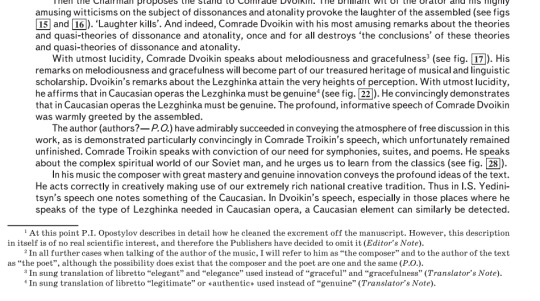

also, this is the best performance of rayok I've ever seen. just. just watch it
would highly recommend reading yabukov's analysis btw. it's WAY more comprehensive than this post, which tbh is just scratching the surface.
#long post#goddamn this took a While#shostakovich#dmitri shostakovich#composers#classical music#history#soviet history#antiformalist rayok#soviet music#classical composer
29 notes
·
View notes
Text
Sister Iris of Hazakura Temple: the Ultimate Defendant of Phoenix Wright
(this is a writeup I've submitted in AA subreddit, so if you recognize the text, this isn't a Matrix lag. Yes, I have a strong opinion about Iris and I want to speak about it more!!)
Starting with the obvious, any Ace Attorney game has a strong and multilayered story and good replayability because of that. It's a very interesting endeavor to just find missed details, to rethink and reconsider some moments in the game after knowing the full story. After completing the game and reaching the major resolution of the plot and mystery, one may look back to find a pleiad of more obscure details that support main plot threads and enrich them. One of the most interesting details of TT's plot is the final defendant and the way she was presented in the game. I believe Iris embodies a lot of thematic weight, and she and the story around her propose a very meaningful challenge - both for Phoenix and for the player
Firstly, the circumstances around Iris are intentionally subversive. After 2-4 we learned that not every single defendant is innocent, so of course we become suspicious when the mysterious girl finds herself at the defendant seat - only for us to be proven that Iris is actually is unlike her sister at all and is a good person (but not completely innocent, to be fair, but about that later). So it's a subversion of an already subversive case, which paints Iris and Bridge as a whole in the very interesting light, tying all three finales of the trilogy together
Perhaps the main theme of the trilogy (and the franchise at large) is trust in the clients and, on the bigger scope, to your friends and close people. Phoenix-Iris relationship embodies that theme, and, again, can be considered a culmination, a resolution of that theme after the three games. It's evident that after the disastrous trial in Memories Phoenix still couldn't let his "Dollie" go. There still was a part of him that believed the girl he spent months with was a genuine person, and when he, at last, learns the truth, he literally says: "You've been the person I thought you are". Reassuring words for Iris herself, they pretty much conclude the "trust theme" and reveal that, again, Phoenix was right to trust the person. Of course, it's really interesting to see a hero being mistaken and growing from that, but it's not any less cathartic to realize that he did a right thing, regardless of the obstacles
Now onto Iris herself. She's an interesting specimen within AA universe on her own, and, despite common opinion, she steps beyond just being a nice-girl-who-is-not-her-murderous-sister. The crux of her character is finding strength, again, her own "two to stand", figuratively speaking, outside of her twisted familial loyalty. Yes, Iris IS guilty by association with Dahlia morally-speaking, as she didn't try to tell the police about Dahlia's atrocities. In some ways Iris is meant to mirror Godot - both of them made mistakes trying to take matters into their own hands thinking they were doing the right thing (Godot with his masterplan in 3-5; Iris with her idea to replace Dahlia and retrieve her necklace and postponing this until Dahlia strikes again). But while Godot's ultimate downfall was caused by being boastfully overly-confident in his capability to protect people, Iris' calamity, again, stems from her inability to speak for herself - she didn't even manage to tell her real name to the person she liked or simply steal the necklace from him
I think it's important to understand that Iris has her flaws - not some cutesy quirks like being shy or anything, rather, more ugly flaws that can affect other people and make her own life worse. Characters aren't meamt to be perfect people all the time, and being framed as "good" in a story doesn't exclude them from being objectively the reason for some atrocious events. I would even argue that a good story should never shy away from such decisions. Iris *is* nice and well-intended unlike Dahlia (who, on the contrary, despite wanting to bring harm was in some way the reason Mia and Phoenix have met which kickstarts the bittersweet emotional journey for Nick in the trilogy), but things she did weren't always good or had benign consequences. Besides, someone being so self-deprecating that it harms not only one"self", but others too is a fascinating and sorely realistic juxtaposition by itself
Nevertheless, after Edgeworth asks her to not deceive Phoenix anymore, she finally decides to tell him (in the front of the whole court, no less - kinda unusual place for a meek girl to confess) the truth about her sister and herself, tells her feelings - and after Phoenix reassured her that she was worth Phoenix's trust after all, maybe that instigates her growth as a person (note that it doesn't necessarily mean that she and Nick should be brought back together, it's more about their past relationship and what they both can learn from that now, after there's no more secrets). The theme of truth is always intertwined with the theme of trust and its importance in our lives. Just like in any other Ace Attorney case, only the reveal of her truth is able to free Iris from the shackles of her disastrous family.
It would be fair to say that Iris was cast aside by the case - after all, the Bridge had a lot going on in it, so you has to look closely to see something about her. There are a few details I personally find endearing about her. When she is in the detention center speaking with Edgeworth, presenting various profiles to her (like Larry's or Maya's) makes her respond in a very positive manner, like "This is a hardworking person", or "This is a very reliable woman". Funnily, Edgeworth remarks that Iris isn't a good judge of people after that, and that may be so - on the other hand, however, it indicates that Iris just generally tries to see good in people. Even about Dahlia, she says first and foremost that she was "strong and never complained about anything" - she understands her twin sister the most. Cumulatively, it all points at the fact that, despite spending the majority of her life in seclusion, she may be perceptive to some degree (the other example, when there's a wrong choice in her Psyche-Locks segment, she suspects that Edgeworth may have a deep secret inside on his own). In many ways she shares these traits with her younger half-sister Pearl, who is a sheltered, but unusually perceptive child herself
There are a few other interesting tidbits about Iris, but these are more like my overthinking. Iris, despite being raised far away from the city, is actually capable of being well-adjusted to modern society, she's relatively well-versed with technology, she managed to go to the university in place of Dahlia. The other interesting moment is the fact that she and Phoenix did have some sort of affinity in fact, because their relationship lasted for eight months without seeming issues (aside from the obvious not-telling-him-my-real-name problem), and, from my experience and observations, even if it's not that log of a period, it happens when two people have similar fundamental worldview and mindset. So Iris, at least to some degree, has something in common with Phoenix - maybe it's her positivity regarding people in general?
Anyway, I believe Iris is worth at least some attention from the fanbase - and not only as one of the possible love interests for Phoenix, but as a character who, as many other people in the Fey family, had a lot of odds stacked against her throughout her life, but in the end having a silver lining and the chance to finally be happy and honest with herself
#ace attorney#aa3#iris fey#iris hawthorne#meta#it's beautiful that female characters like dahlia or adrian are attempted to be treated with nuance these days#kinda want people to give iris the same grace too
27 notes
·
View notes
Text
Of Discoveries and Worries
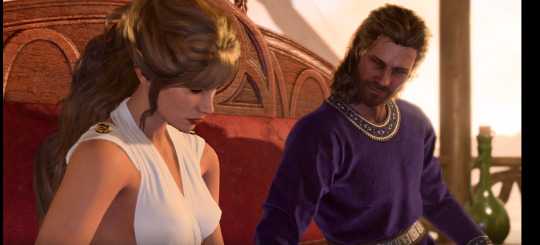
Link to Ao3
Summary:
When Athena Dekarios is bringing some order into the tower, she discovers Gale´s Last Letter which thankfully never had to reach her. What does reach her, however, is a certain realization.
A tear had fallen onto the paper currently vibrating with the trembling of my hands;
the text it held barely decipherable to me, now that emotions had won against me. Not that I would need to see the words that had been carefully noted down – my mind had already stored them away in its vault.
“My love,
I write this letter with the most fervent hope that it might never be delivered.
If you are reading it, then my hope was for naught. I have failed.
Please know – I did not intend to let you down.
I promised you the heavens, and by the gods, I meant to give them to you.
To know that I have disappointed you is more than I can bear to imagine.
Yet sitting here, on the banks of Chionthar, imagining you is all I can do.
You are perfect. You always were, and you always will be. I wish I had told you that more.
I hope the paltry offering of my company was a fair trade for the richness of your love, your strength, your generosity. I treasured them all.
I know a simple letter may not be enough to sooth your hurt. But you will find peace again, and I hope, one day, a more worthy love. It is the least you deserve.
Yours forever,
Gale.”
A sob escaped me, despite my serious attempts at getting myself under control. I knew it was irrational of me to be crying over a letter that – thank the gods – had never been delivered to me. Irritated, I wiped away the offensive salty water, nearly giving into the inner voice that invited me to be compassionate with myself. When I started organizing boxes in the tower, I had not expected to be faced with the past in such heart-clawing way.
The lump in my throat did not want to leave; deeply tied to the nightmarish thought of losing Gale. My insides contracted, making me think of a hand closing around my intestines. Gulping, I tried to remind myself that there was no reason for me to let go of the little food I had recently managed to take to me. I hadn´t lost him – Gale was vital, and his brown love-filled eyes had met mine just about an hour ago. The Netherbrain was gone, the tyranny ended! We had made sure of it. Why then did this letter have such a hold on me? Why did it hurt so incredibly much? Shouldn´t I be alleviated, since its creation had proven unnecessary? Some tears might´ve been considered appropriate, considering the scenarios these written words created of a world without Gale, but this storm of emotion was something I wasn´t accustomed to.
“Mrs. Dekarios, I have the suspicion you shouldn´t be putting yourself under such emotional distress.”
Tara, Gale´s Tressym, had silently entered the room without my knowledge. As untypical as my emotional outbreak may have been, it did not prevent me from noticing the multilayered way the family member had decided to formulate her thoughts.
A deep sigh left me, revealing how tired I already was despite the early hour. Emotional outbreaks apparently could be more draining than some physical fights. I started wondering how more sensitive people could live in a constant state of exhaustion.
“You have suspicions, do you? I can´t say you´re wrong – nobody should put themselves under emotional distress, if avoidable.”
Lifting myself from the kneeling position on the ground, I folded the letter and placed it back in the box I had been searching through before.
Tara jumped onto the foot end of the bed, looking at me curiously and – so was my impression – somehow complacent.
“I was more referring to your current state. One should be more careful than usual when growing a child under one´s heart, don´t you think?”
Silence. Everything seemed to turn into a silent basin of water; the realization falling like a drop into it – causing ripples to form. The otherwise quiet sound of a waterdrop falling suddenly loud.
Pregnant. I was pregnant. Questioning Tara´s instincts was far from me, when faced with the evidence. I had been nauseous, tired and emotional. My husband had taken note of the unusually tender state of my swollen breasts, but I had bled – albeit less than usual – not thinking much about it. I had suspected I was getting sick, counting myself under those affected by the stomach flu taking hold of many in the city, but not being with child.
My movements slowed; the processing of thoughts taking over my focus.
So, I had been right after all, when my intuition had reached out to me after that one time Gale and I shared an intimate moment in the kitchen. I ignored my intuition once and fate laughed at me. I remembered the teasing jokes shared after having told him about my inklings. It was not that we had been unaware of the potential we had to create life, and we had not been unwilling to welcome any child placed in our lap either, but it still came as a shock to me.
Memories flashed into my mind, taunting me playfully.
“I think we might have just made a baby”, I had whispered against his body, lying half on top of him on the kitchen floor. It had been so hot, that the cold kitchen floor tiles had provided a welcome cooling effect.
His chuckling´s vibration against my cheek had provoked a smile on my end and lead me to press a kiss against his hair covered chest.
“That´s always a possibility. Even tea can fail, and as far as I am aware you have not been drinking it in a while.”
Nuzzling his neck – his hand on my arm – had felt like Elysium on Toril. The warmth radiating from his body not overbearing like the heat that had taken the city captive, but rather soothing and invigorating.
The air leaving my lungs quivered on its way.
“He needs to know. Instantaneously.”
I turned, in order to leave the room in search of Gale, when I saw him standing at the door. He looked stunned, uncertain, worried. I opened my mouth but nothing would leave me; tears welled up once more but I managed to keep them from overflowing. He didn´t seem happy. He did not smile or show any other sign of delight. It choked me. Feeling alone with him in the same room was entirely new to me.
He had known this was a possibility, he had agreed to unite with me at a time where fertility was highest. Why was he recoiling?
He silently entered the room, his head hanging. Eyes fixated on his hands, he sat on the bed.
“What are we going to do now?”
I could no longer prevent the tears from making their way down my pain-stricken face.
My feet dragged be slowly towards him.
“What do you mean by asking that question? What are we going to do?! Gale, you knew ! You KNEW and now you treat me like that?”
He looked up at me, his eyes empty; his whole demeanor one of distance.
“I... I don´t know. “
Tara sat silently beside him, even she knew that chiding him right now was not going to do any good.
Nausea was rising again, and this time I had no option but to run to the bathroom to empty myself out. I had no energy left. Nothing had prepared me for the feeling of losing the only person I had ever let truly close to me. My partner in crime, my best friend, my lover... my husband – he had let me down. Something I had feared when I first fell for him and had believed he would never be capable of over time had taken place – he had broken my heart.
The next two days had been dominated by silence. We saw each other, politely registered the presence of the other, but did not really interact. It was hard on me and Tara´s unbelief had been shared by myself. We both suspected he was wrestling with himself; trying to realize what would change and which responsibilities would await him. He had never believed himself to be capable of being a good father, but when we had settled after the end of the war, he had seemed open to building a family with me. The days of silence had given me opportunity to empathize at least partially with him. It couldn´t be easy to understand how much he would have to shoulder. Nevertheless: I felt lonely.
The sun was setting when I came home on the day he approached me again. I was singing a prayer song to Lathander (Codoro, 2017) when I walked through the door to our tower. It gave me hope and connected me with my god whose temple I had just left.
🎵
In the darkness of the night,
In quiet, desperate hours,
I will bring Lathander’s light
And cast out evil with his power.
When joy’s fire flickers out
Amidst shadows dark and gray,
I will announce with mighty shout
The coming of the day.
And so, my precious Morning Lord,
I thank you for this song
And pray that evil’s growing horde
Will break upon your dawn.
🎵
My voice carried through our rooms, I knew, for the walls had been proven thin before.
I assumed Gale was in the study, going over tomorrow´s teaching plan, when I placed the groceries I had bought on my way from the temple on the kitchen table.
“You´re back.”
I gasped and flinched, surprised by his presence. When had he learned to sneak up on me?
“Startling a Paladin isn´t wise, you know?” The words left my lips with a fatigued smile.
He approached me, looking seriously at me. When his hands touched my waist, my head shot up in astonishment. I let him touch his forehead to mine.
“I would like to apologize, my love. My behavior has been atrocious on every level. I was so afraid to fail, that I... “, he paused, his face contorting with the burden of knowledge, “that I ended up failing you, of all people. I promised I would not let you fall, and yet I did. There is no excuse, but I request your forgiveness. I want to remedy what I did. Others want nothing more than a child, desiring an heir and seeing it for the blessing it is, and here I was - suddenly overwhelmed by the prospect of becoming a father. You are more than I ever wished for, and this child inside of your womb – the child we called into existence – is an immeasurable gift. I just hope I will be a worthy father, that I do not let my self-centeredness win. Having a part of you and me walking outside of our bodies in not much time is a wonder I can hardly await.”
Relief flooded me, but with it I frowned. Taking a step back to be capable of looking into his beautiful warmth-filled eyes, I spoke.
“Self-centeredness? You have many flaws, Gale Dekarios of Waterdeep, but that is not one I would list. You have proven your selflessness in more ways than I can count, and the love you have given me has been of the purest form. I worry about not living up to my potential – of not being able to become the mother I would like to become. But you? I never doubted you, love. Never.”
His relief was visible, and the embrace that followed filled with hope. Lathander´s presence was undeniable.
“Finally, you have come to your senses! Morena will be delighted! She already made plans, you know?” Tara´s haughty voice reached us, becoming the source of our laughter.
With a smile that reached his intelligent open eyes, he assured me:
“Love does not capture how much I feel for you, Athena. You are my Universe, you surely must know it.”
My hands framed his handsome face, appreciating the stubbiness of his beard.
“You surely must know that I feel the same.”
He did. He did and made sure we both knew exactly how much we loved each other, by pulling me into our bedroom.
Reference
Codoro (2017) R/dicecameraaction on reddit: A prayer-song of the morning lord , Reddit . Available at: https://www.reddit.com/r/DiceCameraAction/comments/6urzh0/a_prayersong_of_the_morning_lord/ (Accessed: 04 April 2024).
@galesdevoteewife Here we go. ^^
#baldur's gate 3#bg3#gale dekarios#gale of waterdeep#rizzard of waterdeep#fandom#fanfiction#writing#reading#pregnancy#last letter#emotional#angst#fluff#forgotten realms#dnd#video game#romance#rpg#faerun#love#galemance#bg3 fanfiction
10 notes
·
View notes
Note
what do you think about the implications that the fourth wall/dokkaebi king is Jesus
i'm not sure it's an important piece of information in itself, frankly! i believe that someone COULD draw out that piece of info and construct a lot of meaning from it, but to me, it's just a fragment of the larger idea. the dokkaebi king is not just jesus - he is a representation of every founding myth and story in all the world.
so he is jesus. he is god. he is lucifer. I'm sure he is also yggdrasil, or the fates from greek mythology, or any other mythological idea that explains how the world is founded. or any important myth, too. I haven't read the epic of gilgamesh, but I would bet real money that something around him at least references it.
it's not even that any of these figures are his real identity, either. it's implied he doesn't quite have one. the way orv's universe functions, everything is just another incarnation of an older and deeper story. the dokkaebi king himself doesn't know where he originated. he is a representation of the concept of "the founding story," if you will. a story that seems responsible for the origin of everything, but is, in itself, a text whose origin is slightly shrouded in mystery. a final boss who seems like he might be responsible for all the world's evils, but who is ultimately a character in a text, and who by definition cannot be the author or reader who made the constructed reality of the fictional world.
I suppose you can draw a savior/jesus story out of his role as the fourth wall, but I also personally don't see it that way. the dokkaebi king represents not just the text of twsa, but literally all literature and mythology. and while he does protect kim dokja in this role, it is not an unambiguously good or healthy thing, as jesus allegories tend to treat the concept of saviorism. since kim dokja uses fiction itself as a coping mechanism to dissociate himself from daily life, the fourth wall becomes his shield. this makes it so the fourth wall represents both fiction itself AND fiction as a coping mechanism AND fiction as a way of understanding and interpreting the world. its a very multilayered allegory. and while orv ultimately settles on his usage of fiction being an overall good thing, it is HIGHLY nuanced and not afraid to point out how the thing that saves him can also be a hindrance at times. which is sort of antithetical to a jesus allegory lol
#narrates#orv#orv spoilers#<- for my mutuals who havent finished the novel yet#tldr; I'm more interested in the MANY other implications that are brought up when the dokkaebi king's identity is discussed
9 notes
·
View notes
Text
A beginners guide to GIT:
Part 1 - What is GIT? Why should I care?
Table of content:
Part 1: What is GIT? Why should I care?
Part 2: Definitions of terms and concepts
Part 3: How to learn GIT after (or instead of ) this guide.
Part 4: How to use GIT as 1 person
Part 5: How to use GIT as a group.
GIT is a program used via a shell that allows you to save your text based work.
… no really, that is it. That is what “source control” basically means. Nothing mysterious, nothing complex. It saves.
But it saves in a way that gives you extra features! So you can also:
Go back and forth between any time you saved in seconds (So the saves are more like saves in a video game, than saving a file)
Have GIT tell you what changes happened between 2 saves so you can find bugs
Have GIT find which commit last touched a function or file so you can find out when bugs got created
Sexy right?
Furthermore, GIT allows many people to each work on the same project at the same time. Even the same files and the same code.
There are other fringe ways to use GIT, but most use one of 2 ways:
1: Local repository. Basically, a local save, used just by you. Easy peasy.
2: Remote repository. The project has a central save file on a remote server.
Everyone wanting to work on the project copies this, and starts working on their different parts.
When someone has a chunk of work done, they update the central save file with their work.
When you do this, GIT makes sure that the different changes do not interfere with each-other. And if they DO interfere, GIT makes it as simple as possible to merge the 2 changes together.
And it does it while using less than a dozen kilobytes of space. Even for huge projects.
Here is the second best thing. GIT scales perfectly from a single person project to gigantic projects with thousands of developers. You can use GIT , and only GIT , and no matter how your project grows, GIT will still be a good fit for you.
And the best thing? The complexity of using GIT, scales with the complexity of the development environment.
For a single person, it is super simple, and completely pain free
For small teams, it needs a small amount of work and agreements
For large multilayer development teams, it needs somewhat rigid standards for doing things and several people dedicated to making it run smoothly.
This is why the “Use GIT” advice is so universal. Because no matter what you are doing, if it is text, then GIT is THE source control tool to use.
When your code is breaking at 2am and you have lost track of what you changed when and where, GIT will save you!
Many newbies (me included) who did not use GIT, have had to scrap entire projects because they simply could not un-break them again.
14 notes
·
View notes